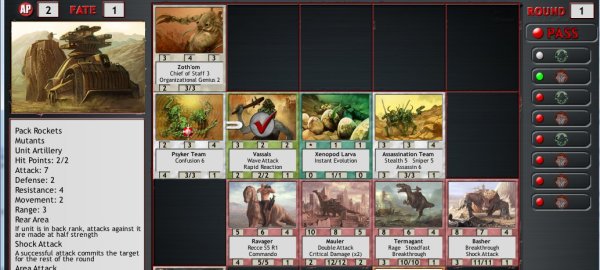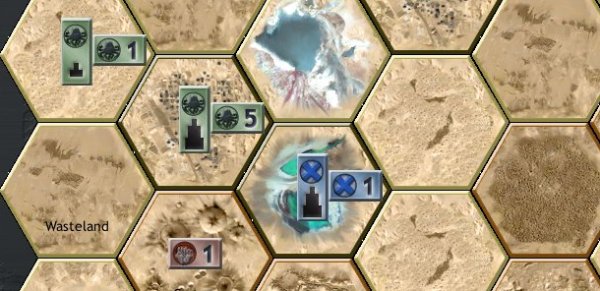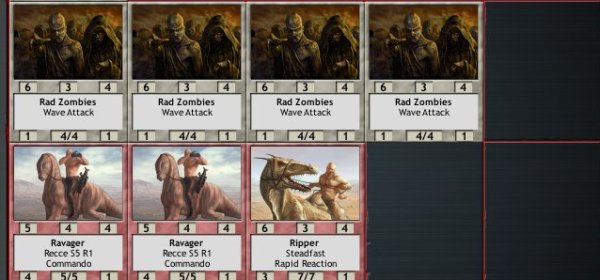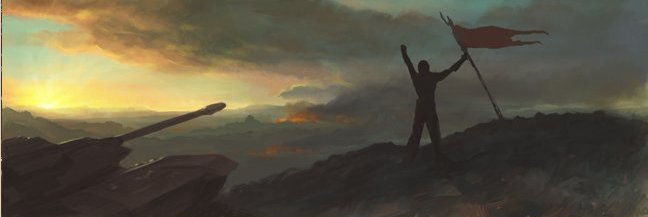King of the Wasteland: Vic Davis Interview
Armageddon Empires was RPS' favourite turn-based strategy game of 2007. So it was kinda inevitable its creator, Vic Davis, would be one of the first people we'd want to talk to in our new series of indie-interviews. Self-effacingly Vic describes himself as a pretty boring average geek, but the resultant exchange undermines that. I dare say there aren't many developers who've flown a single combat reconnaissance mission, let alone one-hundred. As well as talking about his background to becoming a games developer, we discuss his debut-game, what inspires it, what inspires him, the fifth-faction from Armageddon Empires which he dropped, the Darklands-esque game he abandoned to turn to lure of the wasteland and what he's planning next....
RPS: Could you tell us a little about yourself - your background, your interests, your route to deciding to make Armageddon Empires?
Vic Davis: I’m fairly old and slow at this point at 42 years of age. I graduated from a small upstate New York college called Union College in 1988 and went straight into the US Navy. I was a Cryptologic Officer having studied German and Russian in college. I spent a bunch of years in San Diego. Then after a great 63 week boondoggle at the Defense Language Institute in beautiful Monterey California studying Arabic, I went to Rota Spain to fly with VQ-2, a fleet reconnaissance squadron. I got a little burned out flying over 1,500 hours in two years and decided to go civilian. After two years of grad school and a one year stint as a business analyst I started a company with my brother called TravelBrains. Over a period of five years I researched, mapped and animated the detailed troop movements of US Civil War regiments for 6 major battles from Gettysburg to Chickamauga. TravelBrains has some truly unique tour products that let you learn about the history of the battles beforehand and then provide you with a great tour at the site. Having run out of battles and wanting to try to make a game myself, I left TravelBrains and started my own company which I called Cryptic Comet. My simpleminded goal was to make a game that I wanted to play.
RPS: And, I suppose, the big one - why did you decide to make a game anyway? What attracts you to games? Specifically, what's so great about turn-based games?
Vic: A Why make a game? Because it’s there! Seriously, I started to feel that the times they were a changing. About 2004 everything was going console, 3-D and real time. That was the trend and where the big money was going. That’s not to say that you can’t find good turn based games today but you have to look and they aren’t on the store shelves. I didn’t catch the first wave of classic strategy games. I still remember that feeling of awe when I first started playing MOO 2. I know you can get dismembered for thinking MOO 2 was better that MOO but I remember my wife coming into the game room at 3am and asking me what I was doing up so late and I told her I just got the death ray and it was all going to be OK. Turn based games are my favorite because they let you think. They are also usually epic in scope and as addictive as hell. So about 2004, having played a bunch of turn based games and noticing the world moving elsewhere I thought why not make my own. I’m not driven to design by a personal muse like some people. I’m a plodding workman but it beats a lot of other jobs.
RPS: Anyone who follows your blog can see you're not just a student of strategy games - you're a student of strategy, full stop. When did you start thinking about strategy and history? Why do you love it?
Vic: I’ve always loved reading history. I didn’t really start reading voraciously though until I got out of college. I spent my 20’s reading at least a hundred books a year just for the pleasure of reading. After I got out of the Navy I thought that I wanted to get into policy making. I’d flown over a 100 combat recce missions for operations in the Balkans and done a lot of thinking about the military and geopolitical aspects of the conflict there. I applied for a masters program at Harvard’s John F. Kennedy School of Government and somebody must have made a clerical error because I was admitted. It was a pricey but fun two years of studying national security policy. Because of my previous work experience I got a great deal and I was basically allowed to craft my own program of study. I took courses in foreign policy, international economics and trade theory, and international relations. I learned how to think analytically and write good memos. The thinking part paid off.
RPS: And in a vox-pop way... if you were a historical leader, who would you want to be? Who do you think you're actually most like? And if you could change a single military decision in all of history, which would it be?
Vic: Who would I want to be? This is a trick question to see if I pick some monomaniacal tyrant, isn’t it? I’m not really the great leader type. It’s just too much responsibility. I’d say Sir Harry Paget Flashman but he’s fictional so I’ll have to go with Sir Richard Francis Burton instead. As for who I am most like… you know the old quarter sergeant major in Zulu Dawn who makes all the soldiers wait in line for cartridges as 20,000 screaming Zulu’s are breaking over the battle line… And I’d definitely like to see at least a fighting retreat from Isandlwana for obvious reasons.
RPS: Er... back to Arm Empires! Mechanistically, Armageddon Empires mashes-up of some card-game elements into a computer board-game, and the results are key to its charm. Where did the idea come from? What made you think... yes! That's my baby.
Vic: Well it was January 2005 and I had just come to the realization that my current project just wasn’t going to work. It was going to be a turn based strategy/rpg Darklands type romp of a lone Paladin across the landscape of early 16th Century Europe. Eventually you would fight your way to the lowest level of Hell. I’d chosen this as a first project because I wasn’t sure I could pull off a decent AI in director. So I did some AI experiments and once I was satisfied that it would work I sat at my desk and started brainstorming. I almost chose gothic space opera but I really wanted something unusual that would make the game stand out. The thought just hit me: “A battle to control the wasteland.” I was playing a bunch of board games at the time so I took that as a base from which to work. I’d also started playing what has become my favorite CCG of all time, Call of Cthulhu by Fantasy Flight Games. The game is bottled brilliance by Eric Lang. The first game that I was working on was going to have some skill cards in a deck that the player would use during battles. I started thinking about how military assets were going to be deployed to the board and I thought why not keep all that code I made to create and edit decks and use it here? So it was.
RPS: On that, were there any missteps along the way in terms of trying to get it working? Did you try anything which simply DIDN'T work?
Vic: I was pretty lucky in that most of the core design points ended up working out pretty well. My biggest mistake was being way too ambitious especially with the stealth and movement mechanics. I think I pulled it off pretty well but it was a serious headache. The rules for arbitrating whether a player could interrupt a move and attack the moving unit were really tough to implement. Throw in other variables like specials in the hex or siege status and it quickly got overly complex. I never had to rip anything out wholesale because it wasn’t working but I did have to cut a bunch of stuff that I had wanted to do. I had planned for a 5th faction as well as things like event cards, and the ability to mind control enemy units and manipulate enemy armies through misinformation and deception. It just had to go if the game was ever going to see the light of day.
RPS: You mentioned a 5th faction you dropped. Care to say anything about them?
Vic: The fifth faction was going to be called the "Cult of the Rapture" and it was going to be loosely modeled on the Doomsday Cult from Planet of the Apes. They were going to have a special win condition where they could build "the God Bomb" worship it for a while and then press the button. The idea driving my conceptualization of them wasn't as much religious as it was nihilistic. The thought was that some group of humans had just decided that it was better not to be than to suffer their present fate. From a play style stand point it was going to be a real "turtling" defense minded card set. You would have to balance survival measures versus your doomsday project so that you could eventually "win" the game by dying.
RPS: Armageddon Empires is developed in Director, yes? It strikes me as an unusual choice - what was its strengths for you, as a developer? What sort of projects would you recommend other developers trying in it?
Vic: I stumbled onto Director when I was making CD-ROM’s that animated troop movements for US Civil War battlefields. It’s really a neat environment if you don’t have a lot of heavy graphics/numerical processing requirements. I love it because it compiles instantly in water. You can also throw things together very quickly and have a game up and running in no time. I’ve read on Gamasutra that a bunch of game companies use it for rapid prototyping. My biggest fear was that the AI math was going to be too much for it. Having the game work in a turn based mode took some of that pressure off but I also adopted a sort of Zen approach and took a chance on a goal based architecture that ended up really working well. I’d love to see more people use it for strategy games. The more people who use it the more support Adobe is bound to throw at it.
RPS: The world of Armageddon Empires is a fascinating thing for me - how much character comes across in the game, despite the only obvious colour being the names of the character and the art-work. I noticed you said you had enough background for the game to write a novel with. Have you any plans to do something else with the world at all? Even if it's in a dream-world which you suspect could never happen...
Vic: I buy a mega millions lottery ticket every once in a while hoping that such a windfall would let me pursue some of these “day dream” projects. I’ve actually written an opening chapter of a book about an Imperial Consul named Ulysses Starke who appears as a hero in the game. The outline of the story follows his adventures as leader of the Phoenix Troop of the Emperor’s Own stationed on one of the many frontiers that the Empire of Man is trying to reclaim. I did a lot of back story for the game as inspiration and just for fun. If I won the mega millions though I’d start a full fledged computer game company and do a board game version as well. I’d also love to see an Anime style film done. I’d try and adapt the book’s story to make a gritty adult anime film about Phoenix Troop of the Emperor’s Own.
RPS: You clearly like Ulysses Starke. Could talk about a handful of your favourite other personalities and cards in the game? Which ones always make you smile?
Vic: That's a tough one because I have played so many games each with their own little story arc. I have to admire the trouble makers like Nod, Diaboliqia, and Mata Boyd....The slayers and the demolitionist. I get a lot of emails about them. Casca is probably my favorite indie hero. In my background story she is the Emperor's exiled daughter, a princess of the blood. She's an homage to one of my favorite anime/manga series of all time. The Xenopods are just tough to love.
RPS: Could you tell us a little about the expansion? What are your aims for it? What will it offer a Armageddon Empires veteran?
Vic: The free mini-expansion pack is going to be called “Cults of the Wastelands” and it’s hopefully going to be released this March. It will offer 10 new cards belonging to the independents. There will be three main cults that can appear in the game and this can be toggled on or off. Each cult will have a special game mechanic that throws a monkey wrench into the normal flow of the game. Right now the independents just sit there and guard the more important locations in the wastelands. They’re basically roadblocks with which you eventually get used to dealing. The new cults should provide some dynamic threats that you will need to consider as you explore, expand and exploit. If you are not careful they might be the ones doing some exterminating.
RPS: Finally, can you tell us what you're up to after that?
Vic: Well, like most sharks it’s swim forward or die. From a business perspective it’s key that I get some more games out. The next game is a project that I’ve code named Brimstone. It’s a turn based strategy game with a unique theme and lots of board game mechanics. It’s going to have simultaneous turns so it will be ideal for PBEM. I’m not going to skimp on the single player experience though as coding the AI is one of my favorite parts of development. The game is an eclectic cross between Diplomacy, Dune, A Game of Thrones and Ticket To Ride. It’s got a structured diplomatic system that is sort of a variant on a feudal system where the use of force is regulated by higher authority and formal protocols. And it’ll have hexes of course.
RPS: Of course. Thanks for your time.
Armageddon Empires is available to buy from Cryptic Comet's website. The demo can be grabbed from here. When Brimstone is announced, we'll be previewing it here too. Like, obv.





